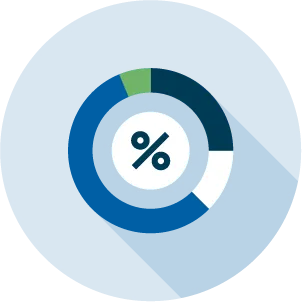A co-op home loan, also known as a share loan, is a type of financing used to purchase shares in a cooperative housing corporation. Unlike traditional mortgages where you're buying a physical property, with a co-op loan you're buying shares that give you the right to live in a specific unit within the cooperative building. These loans are structured differently from traditional mortgages and often have unique requirements set by both the lender and the co-op board.

Co-op Home
Loan
Join a Community with Co-op Financing
Are you looking to become part of a co-op community? A co-op home loan can open the door to your new living space! These loans are specifically designed to make it easier for you to purchase a share in a cooperative housing unit. At Total Mortgage, we are here to walk you through your co-op financing options to ensure you have the support you need to make your homeownership dreams a reality.

Key Benefits
Tax Deductions
Co-op owners may be eligible for various tax deductions, including mortgage interest and property tax write-offs.
Lower Closing Costs
Co-op loans often have lower closing costs compared to traditional home purchases due to reduced fees and paperwork.
Simpler Approval Process
Co-op financing can have a streamlined approval process due to vested interests of co-op boards and specialized lenders.
Community Living
Co-op living offers a strong sense of community and shared responsibilities among residents.
Co-op Home Loan Information
Co-op home loans are designed for purchasing shares in a cooperative housing unit. These loans differ from traditional mortgages in several ways. To better understand how co-op financing can fit into your homeownership plans, you can start by speaking to one of our seasoned experts.
Understanding Co-ops
In a co-op housing arrangement:
- A corporation or management company owns the residential building
- Homebuyers purchase shares in this corporation rather than individual units
- Shareholders collectively share responsibility for property maintenance and upkeep
- Owners pay monthly fees for maintenance, insurance, property taxes, and other expenses
Co-op Financing Requirements
Key points to remember:
- Strong relationship with the co-op board is crucial
- Higher credit score requirements (often minimum FICO of 680)
- Debt-to-income ratio impacts loan approvals
- Detailed financial documentation required
- Liquid asset requirements may apply
- Working with specialized lenders is recommended
Types of Co-op Financing
- Fixed-Rate Mortgages: Consistent interest rate and predictable monthly payments
- Adjustable Rate Mortgages: Interest rate fluctuates based on market conditions
- Jumbo Mortgages: For units above specified price thresholds
- Conventional Loans: Flexible options with choice between ARMs and fixed-rate mortgages
Pros and Cons of Co-op Financing
Understanding the advantages and disadvantages of co-op financing can help you make an informed decision.
Additional Pros
- Potential for various tax deductions
- Lower closing costs compared to traditional home purchases
- Streamlined approval process
- Strong sense of community
Cons to Consider
- Higher down payments (typically 20-30%)
- Limited loan availability
- Resale restrictions
- Potential for complex approval processes
- Shared financial responsibilities with other co-op members
Co-op Home Loan FAQs
Everything you need to know about Co-op Home Loans
What is a co-op home loan?
How does co-op financing differ from traditional mortgages?
Co-op financing differs from traditional mortgages in several key ways:
- Ownership: You're buying shares in a corporation, not a physical property.
- Approval Process: Both the lender and the co-op board must approve your application.
- Down Payments: Co-ops often require higher down payments, typically 20-30%.
- Closing Costs: These are often lower for co-ops as there's no need for title insurance or mortgage recording tax.
- Qualifications: Co-op loans may have stricter credit score and debt-to-income ratio requirements.
- Resale: There may be restrictions on when and how you can sell your co-op shares.
What are the requirements for a co-op home loan?
Requirements for a co-op home loan typically include:
- Credit Score: Often a minimum FICO score of 680 is required.
- Down Payment: Usually 20-30% of the purchase price.
- Debt-to-Income Ratio: This should be within acceptable limits set by the lender.
- Financial Documentation: Detailed financial records including tax returns, bank statements, and pay stubs.
- Liquid Assets: Some co-ops require buyers to have a certain amount of liquid assets post-closing.
- Co-op Board Approval: You'll need to pass the co-op board's application process, which may include an interview.
What are the tax implications of co-op ownership?
Co-op ownership can offer several tax advantages:
- Mortgage Interest Deduction: You can deduct the interest paid on your co-op loan, similar to a traditional mortgage.
- Property Tax Deduction: Your portion of the co-op's property taxes is typically tax-deductible.
- Capital Improvements: Some capital improvements to the building may be tax-deductible.
- Home Office Deduction: If you use part of your co-op unit for business purposes, you may be eligible for a home office deduction.
How does reselling a co-op unit work?
Reselling a co-op unit can be more complex than selling a traditional home:
- Board Approval: The co-op board typically has the right to approve or reject potential buyers.
- First Right of Refusal: Some co-ops give the board or other shareholders the first opportunity to purchase the unit.
- Timing Restrictions: There may be limits on when and how long you can have your unit on the market.
- Price Fluctuations: Co-op values can be more volatile in some markets, affecting resale value.
- Fees: There may be transfer fees or flip taxes associated with selling your co-op shares.

Join a vibrant community with a Co-op Home Loan.











